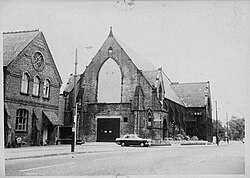Reception
When it was released, Over the Garden Wall enjoyed considerable success. Although most Mancunian productions were only popular in the North of England, Over the Garden Wall attracted audiences in the South, being screened at a large number of cinemas on the Granada Theatres, Odeon and ABC circuits, notably in popular seaside resorts. [4]
Despite its popularity, the Over the Garden Wall film was poorly regarded at the time by the National Film Finance Corporation (NFFC), who decided to withdraw financial support from Mancunian Films. The NFFC chairman, Lord Reith, expressed dissatisfaction with the quality of Mancunian's comedy productions; of Over the Garden Wall , Reith said it was not "of as high a quality as the Corporation would have wished". [4] : 63
Kine Weekly called the film a "disjointed knockabout comedy", [5] adding "the picture tries to set off its corny cracks against a romantic background, but the tangled love interest is so clumsily handled that unintentional laughs are more numerous than intentional. At best, third-rate music hall, flatly photographed."
In British Sound Films: The Studio Years 1928–1959 David Quinlan rated the film as "poor", writing: "The stars spend too much time off-screen in this extension of Norman Evans's famous variety act. Interesting that when it was reissued ten years later, 40 minutes were taken out of it. Nobody complained." [6]
This page is based on this
Wikipedia article Text is available under the
CC BY-SA 4.0 license; additional terms may apply.
Images, videos and audio are available under their respective licenses.


